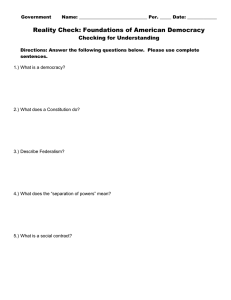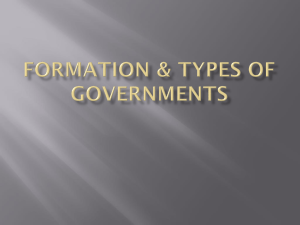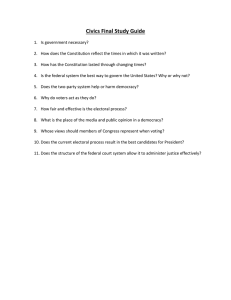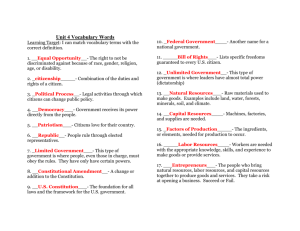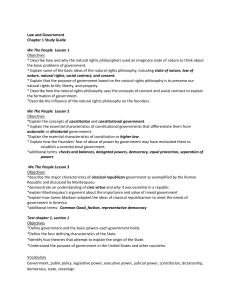Essence Essential Standards Extended Essential Standards CE.C&G.1 Analyze the foundations and
advertisement
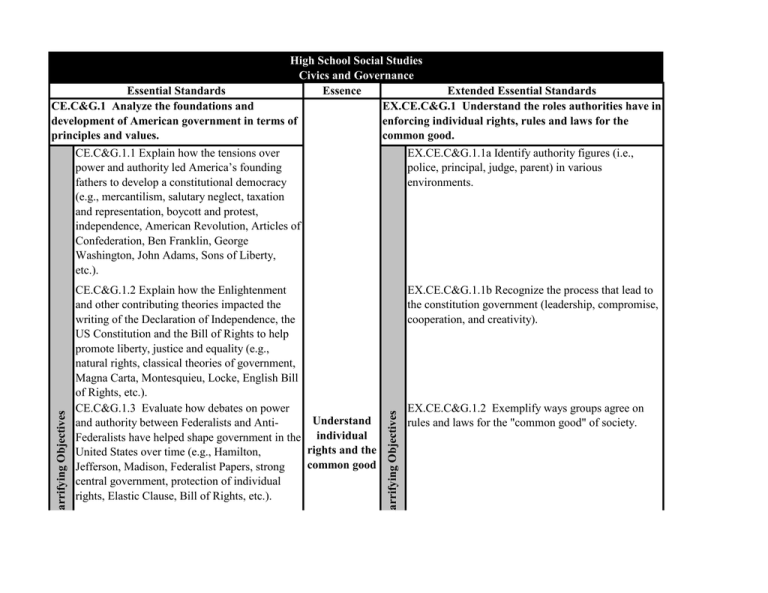
CE.C&G.1.1 Explain how the tensions over power and authority led America’s founding fathers to develop a constitutional democracy (e.g., mercantilism, salutary neglect, taxation and representation, boycott and protest, independence, American Revolution, Articles of Confederation, Ben Franklin, George Washington, John Adams, Sons of Liberty, etc.). EX.CE.C&G.1.1a Identify authority figures (i.e., police, principal, judge, parent) in various environments. CE.C&G.1.2 Explain how the Enlightenment and other contributing theories impacted the writing of the Declaration of Independence, the US Constitution and the Bill of Rights to help promote liberty, justice and equality (e.g., natural rights, classical theories of government, Magna Carta, Montesquieu, Locke, English Bill of Rights, etc.). CE.C&G.1.3 Evaluate how debates on power Understand and authority between Federalists and AntiFederalists have helped shape government in the individual rights and the United States over time (e.g., Hamilton, common good Jefferson, Madison, Federalist Papers, strong central government, protection of individual rights, Elastic Clause, Bill of Rights, etc.). EX.CE.C&G.1.1b Recognize the process that lead to the constitution government (leadership, compromise, cooperation, and creativity). larrifying Objectives larrifying Objectives High School Social Studies Civics and Governance Essential Standards Essence Extended Essential Standards CE.C&G.1 Analyze the foundations and EX.CE.C&G.1 Understand the roles authorities have in development of American government in terms of enforcing individual rights, rules and laws for the principles and values. common good. EX.CE.C&G.1.2 Exemplify ways groups agree on rules and laws for the "common good" of society. CE.C&G.1.5 Evaluate the fundamental principles of American politics in terms of the extent to which they have been used effectively to maintain constitutional democracy in the United States (e.g., rule of law, limited government, democracy, consent of the governed, etc.). Cl Cl CE.C&G.1.4 Analyze the principles and ideals underlying American democracy in terms of how they promote freedom (i.e. separation of powers, rule of law, limited government, democracy, consent of the governed / individual rights –life, liberty, pursuit of happiness, selfgovernment, representative democracy, equal opportunity, equal protection under the law, diversity, patriotism, etc.). EX.CE.C&G.1.3 Recognize individual rights (i.e., tranfer of rights, guardianship, exploitation, neglect and abuse, Americans with Disabilities Act) and the situations in which they can be applied. EX.CE.C&G.1.4 Identify agencies and/or individuals who are responsible for helping to promote freedom and self-determination (i.e., transition planning, vocational rehabilitation, centers for independent living, representative payee). EX.CE.C&G.1.5 Explain circumstances in which rights could be violated. CE.C&G.2 Analyze government systems within the United States in terms of their structure, function and relationships. CE.C&G.2.1 Analyze the structures of national, state and local governments in terms of ways they are organized to maintain order, security, welfare of the public and the protection of citizens (e.g., federalism, the three branches, court system, jurisdictions, judicial process, agencies, etc.). EX.CE.C&G.2 Analyze how the government helps and protects its citizens. EX.CE.C&G.2.1 Explain how governmental agencies (i.e., police,fire department, courts, military) protect citizens and their individual rights. EX.CE.C&G.2.2 Explain the process for changing living documents (rules, laws and rights) based on the needs of the group. CE.C&G.2.3 Evaluate the U.S. Constitution as a “living Constitution” in terms of how the words in the Constitution and Bill of Rights have been interpreted and applied throughout their existence (e.g., precedents, rule of law, Stare decisis, judicial review, supremacy, equal protections, “establishment clause”, symbolic speech, due process, right to privacy, etc.). EX.CE.C&G.2.3 Recognize the process for how rules and laws are enacted. CE.C&G.2.4 Compare the Constitutions and the structures of the United States and North Carolina governments (e.g., the various NC Constitutions, Bill of Rights, Declaration of Rights, Preambles, the organization of, the powers of, responsibilities, etc.). EX.CE.C&G.2.4 Describe the process (identify facts of problem, why is it a problem, what are the choices for fixing the problem, make a decision based on facts) of government made decisions on contemporary issues that apply to everyday life (i.e., Military deployment, medicaid issues, antibullying laws, movie/game ratings). CE.C&G.2.5 Compare United States system of government within the framework of the federal and state structures as well as in how they relate with governmental systems of other nations (e.g. Republicanism, federalism). Impact of government on society and individuals Clarrifying Objectives Clarrifying Objectives CE.C&G.2.2 Summarize the functions of North Carolina state and local governments within the federal system of government (e.g., local charters, maintain a militia, pass ordinances and laws, collect taxes, supervise elections, maintain highways, types of local governments, etc.). EX.CE.C&G.2.5 Compare pros and cons of issues/choices and make a decision based on multiple factors. CE.C&G.2.6 Evaluate the authority federal, state and local governments have over individuals’ rights and privileges (e.g., Bill of Rights, Delegated Powers, Reserved Powers, Concurrent Powers, Pardons, Writ of habeas corpus, Judicial Process, states’ rights, Patriot Act, etc.). CE.C&G.2.7 Analyze contemporary issues and governmental responses at the local, state, and national levels in terms of how they promote the public interest and/or general welfare (e.g., taxes, immigration, naturalization, civil rights, economic development, annexation, redistricting, zoning, national security, health care, etc.). CE.C&G.2.8 Analyze America’s two-party system in terms of the political and economic views that led to its emergence and the role that political parties play in American politics (e.g., Democrat, Republican, promotion of civic responsibility, Federalists, Anti-Federalists, Influence of third parties, precincts, “the political spectrum”, straight ticket, canvass, planks, platform, etc.). CE.C&G.4 Understand how democracy depends upon the active participation of citizens. EX.CE.C&G.4 Understand how democracy depends upon the active participation of citizens. EX.CE.C&G.4.1 Explain the meaning of various American symbols/traditions (i.e., flag, eagle, anthem, pledge, monuments, Independence Day). CE.C&G.4.2 Explain how the development of America’s national identity derived from principles in the Declaration of Independence, US Constitution and Bill of Rights (e.g., inalienable rights, consent of the governed, popular sovereignty, religious and political freedom, separation of powers, etc.). EX.CE.C&G.4.2 Analyze the obligations of citizens by determining when their personal desires, interests and involvement are subordinate to the good of the others (i.e., Civil rights, equal rights under the law, rule of law, personal space, right to privacy). CE.C&G.4.3 Analyze the roles of citizens of North Carolina and the United States in terms of Understand responsibilities, participation, civic life and citizenship criteria for membership or admission (e.g., voting, jury duty, lobbying, interacting successfully with government agencies, organizing and working in civic groups, volunteering, petitioning, picketing, running for political office, residency, etc.). CE.C&G.4.4 Analyze the obligations of citizens by determining when their personal desires, interests and involvement are subordinate to the good of the nation or state (e.g., Patriot Act, Homeland Security, sedition, civil rights, equal rights under the law, jury duty, Selective Services Act, rule of law, eminent domain, etc.). Clarrifying Objectives Clarrifying Objectives CE.C&G.4.1 Compare citizenship in the American constitutional democracy to membership in other types of governments (e.g., right to privacy, civil rights, responsibilities, political rights, right to due process, equal protection under the law, participation, freedom, etc.). CE.C&G.4.5 Explain the changing perception and interpretation of citizenship and naturalization (e.g., aliens, Interpretations of the 14th amendment, citizenship, patriotism, equal rights under the law, etc.).


